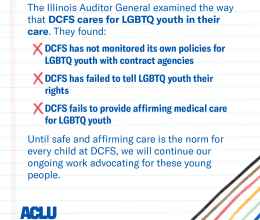Testimony of Ben Wolf, Associate Legal Director Roger Baldwin Foundation of the ACLU of Illinois Joint Senate & House Hearing Testimony Regarding: Documented Abuse at DCFS Residential Facilities January 7, 2015
Thank you for the opportunity to appear today and share the ACLU’s views about the current, regrettable state of the Illinois Department of Children and Family Services. I also want to briefly discuss the ACLU’s most recent actions – which intensified last summer – to specifically address problems at DCFS confirmed by the recent series in the Chicago Tribune, as well as many others.
The sad truth that must be faced today is that the heartbreaking and appalling reports in the Tribune, tales of abuse and neglect of state wards at residential programs, are a symptom of larger problems in DCFS, problems that have multiplied over the past several months.
There was a moment, not so long ago, when, pursuant to an ACLU-secured court order, DCFS was making strides after a sad history. But unfortunately that progress has been halted.
In 2009 a woefully-inadequate DCFS budget prompted the ACLU to return to federal court and seek an order mandating that the State continue adequate funding to meet the needs of the children in state care. The court granted that order.
Rather than learn from that experience, in recent budget years DCFS and sometimes the legislature has regularly shifted funds away from effective programs and processes that protected the children in the Department’s care. DCFS became increasingly reluctant to fund and support independent programs with proven track records of providing accurate data about DCFS’s performance – and its shortcomings. As but one example, DCFS curtailed independent monitoring of facilities like those described in the Tribune, relying instead on inadequate in-house monitoring.
The problems created by inadequate budgets were exacerbated by the lack of leadership at DCFS. It is not an exaggeration to describe the top levels of the agency over the past two years as a "revolving door." Not only was leadership often not well-versed in the provision of child welfare services, they didn't stay long enough to develop an understanding of the critical issues involved.
As a result, the ACLU of Illinois has no confidence in the leadership of DCFS to provide constitutionally-mandated level of service for the children under their care.
These failures have real, human consequences. Children in DCFS care who need mental health and psychological care are subjected to grossly inadequate treatment at residential programs; hundreds of others are warehoused in shelters, psychiatric hospitals, detention centers and other settings because they can’t even get into those programs and, as things currently stand, these children have little hope of ever getting the services they desperately need.
The lack of real leadership can be seen most clearly in the actions taken by the agency since the Tribune series first began to run some weeks ago.
In our estimation, DCFS’ response to the crisis identified by these news stories has been misleading and embarrassingly inadequate.
As a result of losing faith in the agency, the ACLU of Illinois is preparing to return to federal court to force the sort of sweeping change that will transform DCFS into an agency that can serve the children in its custody.
As a starting point in the process, we will urge the court to mandate a revitalized, independent oversight process for all residential programs housing wards of the state. Children under DCFS care who are in these residential programs should be safe and secure, not subject to violence and sexual assault.
Children who rely on the state for protection should never again be subjected to the horrors described in the Tribune's series.
While we work to improve real oversight by DCFS of these programs, we also will ask the court to finally move the State of Illinois into the 21st Century, building a community mental health system for our clients.
These children, having been subjected to the trauma of abuse and neglect in their homes, are entitled to competent and compassionate help in state care.
Placing these children in institutions must be a last resort. As other states have demonstrated, children are much better off – and often can be served at less expense – when they receive the services they need in home-like settings. DCFS has an opportunity to embrace these proposals; but with or without its participation, we are returning to court to mandate these reforms.
We are moving quickly to return to court. In the meantime, we urge Governor-Elect Rauner to support experienced, effective, and stable leadership at DCFS, leadership that will ensure the development and implementation of a comprehensive system of care for all children within DCFS’s agency, and to provide sufficient resources that will assure the basic welfare of children in state care.
Children in state custody have a constitutional right to placements in safe and appropriate homes and to receive adequate mental health services when they need them.



